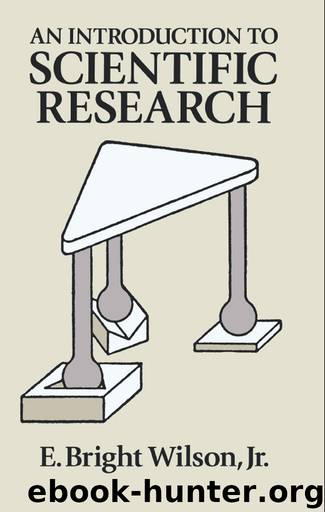An Introduction to Scientific Research by E. Bright Wilson Jr

Author:E. Bright Wilson, Jr
Language: eng
Format: epub
Publisher: Dover Publications
Published: 1952-03-18T16:00:00+00:00
7.8.The Operational Viewpoint
The main conclusion from the considerations of the previous section is that a physical quantity is defined in terms of the operations employed in measuring it. Ideally these operations should be completely specified, but this is not possible, and therefore every scientific quantity has some degree of ambiguity associated with it. This is not an entirely academic question, as was realized after the publication of Einstein’s theory of relativity. The problem of measuring the velocity of a moving object may appear simple in principle, but when the object is moving at high speed and light signals of finite velocity must be used for signaling, the intuitive concepts become inadequate.
This inescapable lack of complete specification introduces a certain degree of flexibility. Where desirable, the definition of every quantity can be still further restricted. This is not usually necessary in the original domain of application, but when new regions are reached, such as those of extreme velocities, extremely small dimensions, extreme accuracy, or extreme temperatures, it may turn out that some extra specification to the measuring process has to be added which was of no importance originally. It also may be true that there are several alternative ways of making this additional specification. The choice can then be made on the basis of utility, since all possibilities are presumably compatible with the original definition in the original range of conditions.
A somewhat similar situation arises when conditions are reached under which the original method of measurement cannot be used. If length is defined by means of the operation of laying down a foot rule, it obviously needs modification when applied to distances between atoms in a crystal. The problem is very similar to that of “analytic continuation” in mathematics. It is a question of choosing a new method of measurement—a new set of operations—which gives results in agreement with the old method where both can be used but is capable of application to new circumstances.
There may well turn out to be several perfectly reasonable ways of extending the definition of a scientific quantity into new domains. They may all agree with the original method in the overlap region but disagree in other regions. In these circumstances a choice must be made.
This argument shows that the properties which have been shown experimentally to be possessed by a scientific quantity in the domain of its original definition are not necessarily preserved when the definition is revised so as to apply to other domains. It is therefore important, each time such an extension is made, to carry out experiments to see what properties are preserved.
Download
This site does not store any files on its server. We only index and link to content provided by other sites. Please contact the content providers to delete copyright contents if any and email us, we'll remove relevant links or contents immediately.
The Hot Zone by Richard Preston(2009)
Rigor Mortis by Richard Harris(1708)
How Innovation Works by Matt Ridley(1638)
Oxymoronica by Dr. Mardy Grothe(1558)
Mawson's Will by Lennard Bickel(1453)
Kathryn Bowers & Barbara Natterson-Horowitz by Zoobiquity(1411)
THE DEMON HAUNTED WORLD by Carl Sagan(1349)
The Future of the Mind: The Scientific Quest to Understand, Enhance, and Empower the Mind by Michio Kaku(1332)
Bankrupting Physics by Alexander Unzicker(1317)
The End of Breast Cancer by Kathleen T. Ruddy MD(1294)
Statistics Done Wrong: The Woefully Complete Guide by Alex Reinhart(1293)
The Ghost Hunters by Deborah Blum(1280)
One Two Three ... Infinity: Facts and Speculations of Science by George Gamow(1236)
Science Book by Big Ideas Simply Explained(1229)
The Universe Speaks in Numbers by Graham Farmelo(1217)
The Wizards of Langley by Jeffrey T Richelson(1132)
Biomimicry by Janine M. Benyus(1106)
Rigor Mortis: How Sloppy Science Creates Worthless Cures, Crushes Hope, and Wastes Billions by Richard Harris(1077)
The Case Against Fragrance by Kate Grenville(1050)
